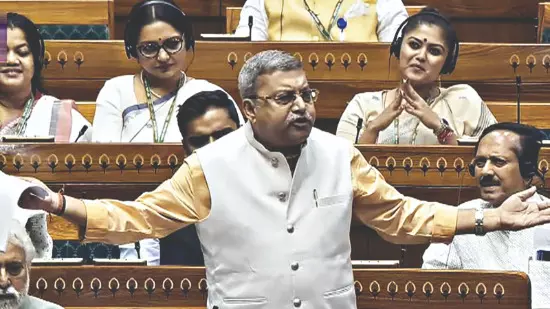TMC calls Waqf Bill ‘attack on religious autonomy’

New Delhi: Heated debates erupted in the Lok Sabha on Wednesday as the Waqf (Amendment) Bill 2025 faced strong opposition from several political parties, particularly the Trinamool Congress (TMC).
The contentious bill, aimed at restructuring the administration of Waqf properties, was criticized for infringing on religious autonomy and constitutional rights.
Leading the charge against the bill was senior TMC leader Kalyan Banerjee, a member of the Joint Parliamentary Committee (JPC) on the bill. Banerjee argued that the proposed amendments violate Article 26 of the Indian Constitution, which protects the right of religious denominations to manage their affairs.
He asserted that the bill’s provisions erode the traditional autonomy of Waqf boards, undermining the longstanding Islamic principle of charitable trust management.
Critics of the bill have also expressed concerns over its centralizing tendencies, which they argue will place Waqf properties, including vast tracts of land and financial resources, under the overarching control of the central government.
The TMC contends that such centralization contradicts the fundamental purpose of Waqf institutions, which historically function autonomously to serve religious, educational, and charitable causes. They warned that politicizing these institutions could compromise their community-driven mission.
The government, however, defended the bill as a necessary reform to enhance transparency and accountability in the administration of Waqf assets, which span over 600,000 acres across the country. Despite these assurances, Opposition MPs remained unconvinced, accusing the Centre of encroaching on religious governance and disregarding state jurisdiction over land matters.
Highlighting constitutional concerns, Banerjee pointed out that the bill infringes upon states’ legislative authority over land, as outlined under Article 246 and the Seventh Schedule. He argued that Parliament lacks the mandate to legislate on Waqf properties, which are traditionally under state jurisdiction. Banerjee also objected to provisions altering the historical nature of Waqf and introducing discriminatory requirements, such as the stipulation for individuals to have practiced Islam for at least five years before creating a Waqf.
Other Opposition leaders echoed these apprehensions, citing Supreme Court judgments that recognize that once a property is used as a mosque and prayers are held there, it irrevocably becomes Waqf property.
They criticized the bill’s registration and declaration requirements, calling them a violation of rights guaranteed under Articles 25 and 26. Critics also objected to provisions granting the Comptroller and Auditor General (CAG) powers over Waqf audits and altering tribunal compositions, which they believe curtail legal recourse. Additionally, they argued that barring Muslims from two key Waqf board positions infringes on the right to equality under Article 14.



